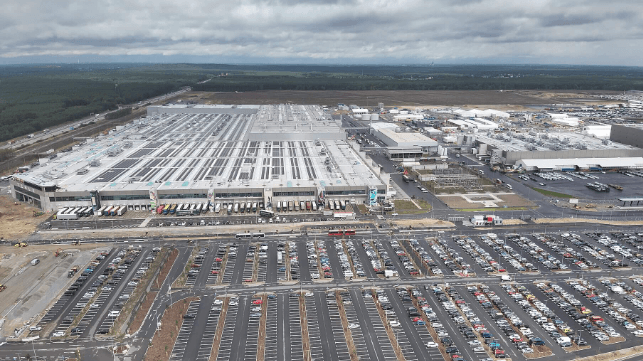
Image:The Tesla Berlin-Brandenburg plant. Michael Wolf Penig
Yemen’s Houthi rebels continue to wreak havoc on commercial shipping in the Red Sea, employing drone and missile attacks since November. The repercussions are reverberating across the globe, with containerized freight rates doubling on the critical Asia-Europe route. Amidst growing tensions and imminent U.S. and UK airstrikes against Houthi positions, Tesla, the world’s second-largest electric car manufacturer, declared a two-week suspension of production at its cutting-edge Gigafactory in Berlin-Brandenburg due to severe supply chain disruptions.
In a press statement, Tesla explained, “Due to a lack of components, we are forced to suspend vehicle production at the Gigafactory Berlin-Brandenburg between January 29 and February 11, with the exception of a few sub-areas.” The company highlighted the ripple effect of armed conflicts in the Red Sea, leading to substantial shifts in transport routes between Europe and Asia via the Cape of Good Hope, directly impacting production at the German plant.
Tesla isn’t alone in grappling with supply chain disruptions caused by the Red Sea turmoil. This week, the Federation of German Industries urged the German government to provide military protection for Red Sea shipping, emphasizing potential significant consequences for the German economy if the attacks persist.
The recent U.S.-British airstrikes on Houthi positions may alter the dynamics in the Red Sea, but until confidence is restored in the security of the route, elevated freight rates and extended transit times are expected to persist. To adapt to this shifting landscape, shippers are exploring a new “Cape route” paradigm by diversifying supply chains and considering alternative routes.
Rail operators report a surge in interest in Eurasian overland rail services, which, although faster, come at a higher cost compared to ocean freight. This option, while niche, is gaining traction, especially for high-value cargo in limited quantities. In 2021, China-Europe container-on-rail trade accounted for around 600,000 TEU, a fraction of the 26 million TEU in China-Europe maritime trade that year, according to The Diplomat.
As the maritime industry grapples with the complexities of the Red Sea disruptions, the pursuit of alternative routes and supply chain diversification remains paramount for global businesses.
Sourcs:The Maritime Executive

